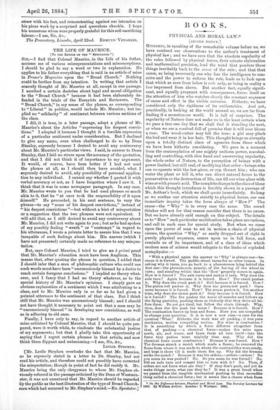THE LIFE OF MAURICE.
[To THE EDITOR OP THE " SPECTITOE.1 SIR,--I find that Colonel Maurice, in the Life of his father, accuses me of various misrepresentations and misconceptions. I should be glad to say a word or two in explanation. He applies to his father everything that is said in an article of mine in Eraser's Magazine upon the " Broad Church." Nothing -could be further from my intention. In writing that article I scarcely thought of Mr. Maurice at all, except in one passage. I ascribed a certain doctrine about legal and moral obligation to the "Broad Church" because it had been elaborately de- fended in the trials of the Essayists and Reviewers. The "Broad Church," in my sense of the phrase, as corresponding to "Liberal" in politics, would include Mr. Maurice ; but im- plied no " solidarity " of sentiment between various sections of the class.
I did, it is true, in a later passage, adopt a phrase of Mr. Manrice's about the Articles " expressing his deepest convic- tions." I adopted it because I thought it a forcible expression of a particular sentiment under consideration. But I declined to give any name, even when challenged to do so by Dean Stanley, expressly because I desired to avoid any controversy about Mr. Maurice's particular views. I said, in answer to Dean Stanley, that I laid no stress upon the accuracy of the quotation, and that I did not think it of importance to my argument. It would, of course, have been better if I had not used the phrase at all, as I should then have avoided, what I ircpressly desired to avoid, any possibility of personal applica- tion to any individual. I cannot say whether I quoted it with verbal accuracy or not, as I have forgotten where I saw it. I think that it was in some newspaper paragraph. In any case, Mr. Maurice wrote to you that he had used phrases so much -akin to it, that he "at once took the responsibility of it upon himself." He proceeded, in his next sentence, to vary the phrase—to say " some of his deepest convictions," instead of '" his deepest convictions "—but without a hint of misquotation -or a suggestion that the two phrases were not equivalent. I -will add that, as I still desired to avoid any controversy about Mr. Maurice, I did not write again to you ; but as he had spoken -of my possibly feeling " wrath " or " contempt " in regard to his utterances, I wrote a private letter to assure him that I was incapable of such feelings about him. His answer (which I have not preserved) certainly made no reference to any misquo- tation.
But, says Colonel Maurice, I tried to give an a priori proof that Mr. Maurice's education must have been Anglican. This means that, after quoting the phrase in question, I added that I should infer that a man of philosophic culture who could use such words must have been " unconsciously biassed by a desire to reach certain foregone conclusions." I implied no theory what- ever, and I fancy that I had no theory whatever, as to the special history of Mr. Maurice's opinions. I simply gave an obvious explanation of a sentiment which I was attributing to a -class, and to Mr. Maurice only in so far as he had given a pointed utterance to the sentiment of that class. lint I think still that Mr. Maurice was unconsciously biassed ; and I should not have thought it necessary to point out that a man may be "unconsciously biassed" in developing new convictions, as well as in adhering to old ones.
Finally, I have only to say, in regard to another article of mine criticised by Colonel Maurice, that I should be quite pre- pared, were it worth while, to vindicate the substantial justice of my arguments ; but that I gladly take this opportunity of saying that I regret certain phrases in that article, and now think them flippant and unbecoming —I am, Sir, &c.,
LESLIE STEPHEN.
Dlr. Leslie Stephen overlooks the fact that Mr. Maurice, as he expressly stated in a letter to Dr. Stanley, had not read his article, and therefore could not possibly have corrected the misquotation, though in point of fact he did rectify it. Mr. Maurice being the only clergyman to whom Mr. Stephen ob- viously referred in the passage criticised by the Dean of Westmin- ster, it was not unnatural that Mr. Maurice should be regarded tliy the public as the best illustration of the type of Broad Church- tnen which had occurred to Mr. Stephen's mind.—En. Spectator.]


































 Previous page
Previous page